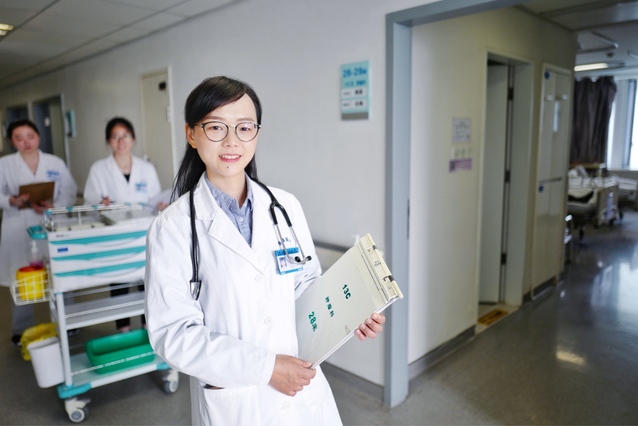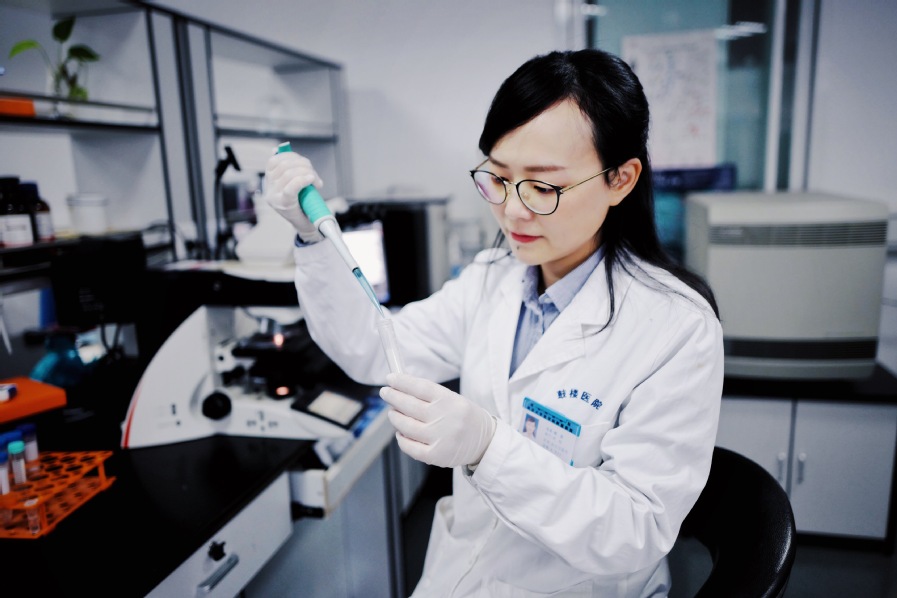Wei Jia wins the 24th Chinese Youth May Fourth Medal.
She has zero complaint in her 12-year medical practice.
Her team has raised the effective rate of late gastric cancer treatment by 14%.
One Chinese Youth May Fourth Medal this year goes to Wei Jia, an associate professor and doctoral supervisor at the medical school of Nanjing University and a chief physician at Nanjing Drum Tower Hospital, the university’s teaching hospital.
The 24th Chinese Youth May Fourth Medals were jointly awarded by the Communist Youth League and All-China Youth Federation to honor outstanding youths on the eve of China’s May Fourth Youth Day.

Born in 1983, Wei was admitted to Nanjing University at age 16 and received her doctorate at 25… The “straight A student” is now a doctoral supervisor at the university’s medical school.
As a doctor, she serves over 8,000 cancer patients each year and has never received any complaint.
Through the hard efforts over the past 10 years, she and her team have developed a new, individualized medication method the clinical application of which has increased the effective rate of late gastric cancer treatment by 14%.
“When patients come to me, I hope I can say I still have some treatment to use.”
“We have been working with no interruption since the outbreak of COVID-19,” Wei Jia said. “Unlike other patients, cancer patients have no time to wait. Although we can’t change the fact that they have cancer, we can try our best to maximally improve the effective rate.
“Our goal is clear: to help the patients live as long as possible and improve their quality of life through our treatment.”
According to Wei, over half of the newly found gastric cancer cases and deaths in the world are in China. People suffering from gastric cancer are getting younger and younger, and it is especially common among young women. Research on medication for gastric cancer progresses slower than that for other cancers, and there are also fewer ways of treatment for it.
“Because those we are faced with are cancer patients and their treatment is a long process,” said Wei, “we should not only be concerned about medications during this process, but also take into consideration many other factors, like physical and psychological changes of the patients and even the thoughts of their family members.”
“Sometimes,” she added, “we may face patients who are our teachers, colleagues or friends and may encounter occasions on which we feel particularly sad and even powerless. Each time, however, we have to try our best to readjust our mentality.”
She said one of her predecessors told her “never to make friends with patients,” especially not in the oncology department, because the pain would be hard to bear when one fails to save a friend’s life.
“However,” she said, “the pricking brought by such feeling of powerlessness at work will continuously motivate us in our clinical research.”
She and her oncologist colleagues usually spend a lot of time talking with patients and their families about their conditions and treatment plans, in order to relieve them of worries and establish the doctor-patient trust.
If no treatment can work anymore, a hospice team will help patients and their families better face the fact and help the patients leave with dignity.
Wei quoted an expression as saying, “We occasionally cure them (patients), often help them, and always comfort them. This is particularly true in the oncology department.”
Medical treatment always has its limits, according to Wei, so it is quite normal for oncologists to watch a vigorous life going lifeless.
Shortly after her son was born in 2017, Wei Jia had an opportunity to study abroad. Although she would miss the chance to hear the baby speak for the first time, she chose to go abroad, only because she hoped she could always say “I still have some treatment to use” when patients come to her.
“The atmosphere of my team is very positive,” said Wei. “Many of our patients are also optimistic, so the treatment proves effective.”
Although she was suggested not to make friends with patients, she often helps patients with financial difficulties to apply to the relief funds.
A woman impressed her deeply in her career as a doctor. “She was only in her 20s and was diagnosed as having late gastric cancer. She nevertheless always had smiles on her face, and her smile had warmed many other people in her ward. Different from others, she even didn’t care much about the change in the decimal points on her lab reports.”
“Due to her heavy financial burden, we helped her apply for the relief fund twice from the hospital and launch two public fundraising,” said Wei. When a patient fully trusts you, you have to force yourself to find her a ray of hope even when there is no way.
“There is still some way,” said Wei, who together with her colleagues had tried on her various kinds of new medicines and treatments. Internationally, patients in her conditions live on average less than one year, but she had managed to live for more than three years.
“Sadly,” said Wei, “she didn’t make it through this year. Her mom recently visited my office, told me things that happened before she passed away, and expressed gratitude on behalf of her daughter.”
“No matter what, we had built our friendship,” said Wei in concluding the story.
“Being a doctor should be the first career choice for young people.”
Wei Jia decided to make oncology her specialty when she was studying at Nanjing University.
“My husband is an orthopedist, and my parents are both physicians,” said Wei. “If my son wants to pursue medicine in the future, I will definitely support him. I think being a doctor is very honorable. The only shortcoming of being a doctor, if I must say one, is that doctors are so busy that their kids have to be looked after by their parents for most of the time.”
Shi Dongquan, Wei Jia’s husband, is also a doctoral supervisor at Nanjing University’s medical school. They both entered the medical school in 1999 and chose to work at Nanjing Drum Tower Hospital upon graduation.
Apart from daily medical work, they need to carry heavy loads of teaching and research. As they are both doctors, they understand and give support to each other.
Wei Jia spends some of her spare time doing clinical research after work, and it is normal to find her working at home.
Ever since the time of her graduate work, she has begun to study clinical treatment of gastric cancer.
Given the poor effect of chemotherapy in treating gastric cancer, she is researching individualized treatment with the guidance of molecular marks, that is, coming up with different individualized treatment plans according to patients’ different genes and tumor tissue structures.

Wei Jia doing research
“At present,” Wei said, “tumors can’t be eradicated, and the world has not reached this level. But we can make efforts bit by bit to improve the effect of treatment and benefit our patients. This vision provides the motive for our work.”
After over 10 years of hard work, Wei Jia and her team have developed a new individualized medication model and applied it to clinical practice. Now they have increased the effective rate of late gastric cancer treatment by 14%.
Moreover, She has developed the new technology of tumor vaccine and cell therapy, participated in the founding of a new tumor treatment model called “ternary linkage” hospice care, and launched academic salons for young oncologists and a public welfare program named “Fighting with Cancer Summer Camp,” which provides training for doctors and medical students .
“I hope more and more young people will pursue their careers as doctors,” said Wei Jia. “Medical education is meritocratic and has high requirements for students’ knowledge reserve and overall cultural quality. It is truly a worthy career that can bring you a sense of satisfaction unable to find in many other professions.”
She added that studying medicine is not easy and might be easily given up when one hesitated. “So now I’m particularly willing to ‘brainwash’ young students.”
Wei Jia also noted: “Studying medicine would be a hard journey, during which one would face a lot of difficulty, but young people are bound to work hard. Although efforts may not guarantee success, they will pay off, be it achievements or a sense of satisfaction in the process. All of them are precious.”
Profile:
Wei Jia, a doctor of medicine and oncology from Nanjing University, a visiting scholar at Harvard Medical School, an associate professor and doctoral supervisor at Nanjing University, a chief physician at Nanjing Drum Tower Hospital, the Affiliated Hospital of Nanjing University Medical School, a deputy director of Clinical Cancer Research Institute at Nanjing University, a chief scientist of major special sci-tech projects of the Ministry of Science and Technology, and a recipient of Outstanding Youth Fund, and a major medical expert of Jiangsu Province.
Through over 10 years of hard work, she and her team have developed a new individualized medication model and applied it to clinical practice, and that helped them increase the effective rate of late gastric cancer treatment by 14%.